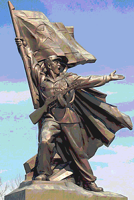Falangism?
+2
Rev Scare
RedSun
6 posters
 Falangism?
Falangism?
According to the fount of all knowledge that is Wikipedia, the Falangists in Spain were fully titled the Spanish Phalanx of the National Syndicalist Offensive. That same site also tells me that the Spanish Falangists were corporatist. Can anyone clear this up for me?

RedSun- _________________________

- Tendency : Revolutionary Syndicalist
Posts : 246
Reputation : 143
Join date : 2011-11-05
Location : Canada
 Re: Falangism?
Re: Falangism?
The Spanish "National Syndicalists" were not genuine syndicalists, but instead promoted class cooperation through trade unionism, corporatism, and state subordination. This was inspired by the proto-fascist conception known as Integralism. The movement eventually merged with the Falange and was later coopted by Franco. The "national syndicalists," both in Italy and Spain, were very much reactionaries.
 Re: Falangism?
Re: Falangism?
RedSun wrote:According to the fount of all knowledge that is Wikipedia, the Falangists in Spain were fully titled the Spanish Phalanx of the National Syndicalist Offensive. That same site also tells me that the Spanish Falangists were corporatist. Can anyone clear this up for me?
The Falange was a fascist party comprised of earlier kindred movements — Ledesma-Ramos' Juntas de Ofensiva Nacional-Sindicalista (JONS) and Primo de Rivera's Falange Española. The ideology the party adopted was referred to as "national syndicalism" (syndicalism being a radical-sounding euphemism). It is critically important not to confuse this 'national syndicalism' with actual (socialist) syndicalism, as the former's economic basis was unambiguously bourgeois in essence. For example, the Falange supported private property and only insisted upon outright nationalizing the financial sector. Outside of that intervention, selected industries would be subject to corporativist planning, while the rest would continue to function independently, in a structured market capacity. Welfare measures and full employment schemes were ostensibly supported and disingenuously presented as the party's 'rejection' of capitalism. (Does any of that sound familiar?)
Now, the 'radical' faction of the Falange (influenced by Ledesma-Ramos' ideas) did support a land reform policy characterized by large-scale (uncompensated) expropriations and a corresponding redistribution to the peasantry, the properties of which would either be held by independent farmers or voluntarily collectivized. However, the more conservative faction of the party — what Primo de Rivera essentially represented — frequently clashed with the former faction on these sorts of issues. (Does any of that sound familiar?)
Eventually, Ledesma-Ramos left the party, citing its gradual rightward shift. (Does any of that sound familiar?) The Falange remained an irrelevant party until the outset of the Spanish Civil War. At that point, Primo de Rivera (now in custody), had the party formally align itself with the reactionary rebels — most likely under the naive assumption that this would somehow lead to the party's acquisition of state power.
What the Falange represented during the Civil War was a form of political propaganda, intended to solicit support from Nazi Germany and Fascist Italy and also demonstrate some sort of ideological coherency to the Spanish people. Franco exploited those qualities to the utmost before systematically destroying the Falange. (He accomplished that particular feat through a forced merger between the original Falange Española de las Juntas de Ofensiva Nacional Sindicalista and their rivals, the Carlists — creating the Falange Española Tradicionalista y de las JONS — as well as purging the party's prominent figures. The military division Franco supplied Nazi Germany with on the Eastern Front also killed off many original Falangists.)
Falangism's legacy, in Franco's Spain, was eventually reduced to a few inconsequential (corporatist) institutions, applied in certain industries — some historians assert that Franco only made this concession because of pressure that was applied by Mussolini — and a bit of its symbolism and rhetoric.
Overall, Falangism (in all of its relevant manifestations) is quintessentially fascist. It shares all of fascism's defining characteristics. Its economics were fundamentally bourgeois, it was highly religious (despite its occasional secular pretenses), its view of the state was authoritarian, and its conception of 'nationalism' was nothing more than a desire for imperialistic (Castilian) hegemony over the unique nations of Iberia and the nations that were once part of the Spanish Empire.
Don't let words like 'phalanx' and 'syndicalism' trick you. (Radical aesthetics and rhetoric are all part of fascism's facade.) Once you explore the ideological substance behind all of it, you will discover that there is nothing remotely revolutionary about Falangism.
Incidentally, the Falangists were not the first fascists to expropriate the word 'syndicalist'. This tradition actually began in Italy and the history is far more nuanced than one might expect. It's really deserving of its own thread.
 Re: Falangism?
Re: Falangism?
I would say they were originally a centrist and revolutionary movement but they allied themselves with Franco and monarchists and became a reactionary far-right movement.

TotalitarianSocialist- ___________________

- Tendency : National SOCIALIST with left wing sympathies.
Posts : 41
Reputation : 7
Join date : 2011-10-21

Red Aegis- _________________________

- Tendency : RedSoc
Posts : 738
Reputation : 522
Join date : 2011-10-27
Location : U.S.
 Re: Falangism?
Re: Falangism?
If not mistaken, there were surviving radical Falangists who end up aligning with the left, especially radical Syndicalists. National Syndicalism under Franco is neither National nor Syndicalist, he just rather used it-come to think that how come the economy end controlled by the church (via Opus Dei) as well as emphasising "order" than "change" Ledesma envisioned?
Permissions in this forum:
You cannot reply to topics in this forum







